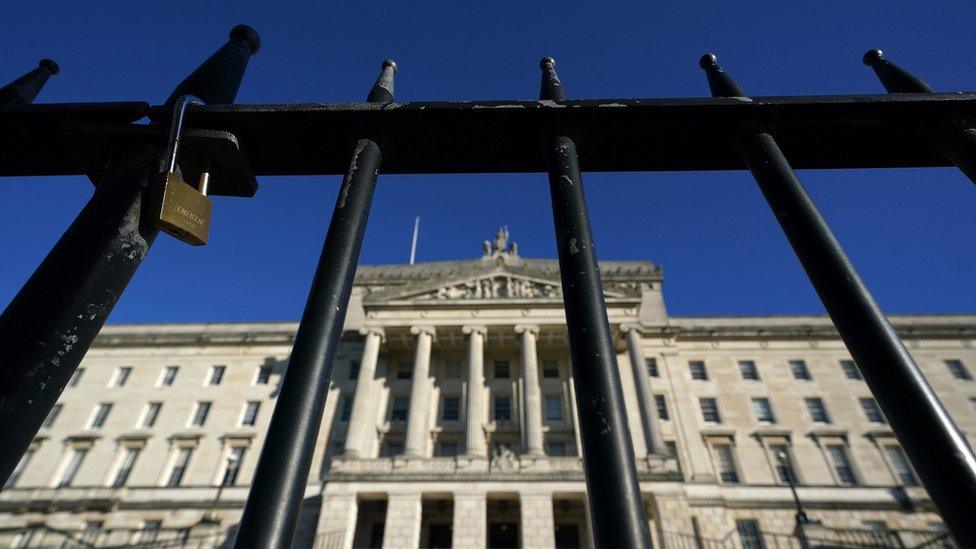Stormont stalemate: Heaton-Harris pushes back NI election deadline
- Published
- comments

Assembly members have continued to receive their £51,500 salary despite NI's government not functioning since February
The government has extended the deadline for a Northern Ireland executive to be formed and outlined plans to cut assembly members' pay.
There has been no Stormont government since February as the DUP has refused to return to power-sharing.
The new 8 December deadline for forming an executive can be further extended by six weeks. It means the latest an assembly election can be held is 13 April 2023.
MLA wages will also be cut by £14,000.
In a brief statement to the Commons, NI Secretary Chris Heaton-Harris said: "The vast majority of those I have spoken to think that an election at this time would be unwelcome."
Pay cut
Assembly members (MLAs) currently receive an annual salary of £51,500 a year.
Mr Heaton-Harris said the public were frustrated to see politicians receive their full salaries without an executive and said he would cut wages "appropriately".
It was confirmed this would be a 27.5% cut, meaning the salary would be £37,337 if legislation is passed.
In 2018, then-NI Secretary Karen Bradley cut MLA pay by 27% when Sinn Féin blocked the formation of an executive.
Mr Heaton-Harris also announced plans to give civil servants more powers to address a £660m budget black hole.

Election date confusion
May 2022 - Sinn Fein wins most seats in Assembly election; DUP refuses to nominate deputy first minister, meaning no executive can formed
4 October - Newly-appointed NI Secretary Chris Heaton-Harris says he will call a fresh election if no executive is formed within 12 weeks - on 28 October
18 October- He says he "cannot be clearer" that an election will be triggered if executive is not restored by 00:01 on 28 October
19 October - He defends his plans
28 October- Legal deadline passes. Mr Heaton-Harris says he will hold an election, but does not set a date
4 November - It is announced there will be no election before Christmas
9 November - Deadline for reforming executive set to be extended to at least 8 December
13 April - Deadline for fresh election (if 12-week window for holding poll opens on 19 January)

In October, Chris Heaton-Harris said he would call an election if the executive formation deadline was missed
The DUP has said its protest is against the post-Brexit trading arrangement known as the Northern Ireland Protocol.
This was designed to ensure free trade could continue across the Irish land border, but it has led to new checks on some goods moving between Great Britain and Northern Ireland.
Sinn Féin won the most seats in May's election, entitling the party to nominate for the position of first minister.
It has accused the DUP of refusing to return to power-sharing because an Irish nationalist would take up the post.
Speaking after the statement by Mr Heaton-Harris, Sinn Fein's Michelle O'Neill accused the secretary of state of "dithering and indecision".
"The deadline passed...now we have new deadlines. I want them to find an agreed way forward on the protocol and do it quickly," she added.
Ms O'Neill also suggested the cuts to MLAs' pay should be targeted specifically at the DUP.
"It's them alone that are actually blocking the formation of an executive."

The referee who blew for extra-time

Faced with a deadlock he could not break the secretary of state and part-time referee opted for a chunk of extra-time and a penalty for Northern Ireland's politicians.
It was in the end the only call Chris Heaton-Harris could make after he blinked first in his stand-off with the DUP.
Although he remains the man in the middle he has lost much of his authority.
After his climbdown last week when ruling out a pre-Christmas election, the secretary of state completed his U-turn by ditching the previous 12-week window for an election to take place.
Instead, he will now legislate for a "short, straightforward extension" to allow more time for the crisis to be resolved.

Addressing Mr Heaton-Harris in the Commons, DUP leader Sir Jeffrey Donaldson said the UK government needed to find a solution to the Northern Ireland Protocol.
He said if the secretary of state "wants to restore Stormont, then he must ensure the government replaces the protocol with arrangements that unionists can support".
Irish Foreign Minister Simon Coveney said he welcomed the deadline extension as it provides "further space" for talks on the issue between the UK and the EU.
Alliance Party leader Naomi Long said the change of dates did not change the "pressing need for reform of the institutions", while Social Democratic and Labour Party leader Colum Eastwood called for the DUP to "stop this charade" and return to the executive.
Traditional Unionist Voice leader Jim Allister said he had no issue with the reduction in salary and insisted the protocol should be rejected.
Public sector pay
During his announcement, Mr Heaton-Harris did not commit to implementing public sector pay recommendations for Northern Ireland.
In July, the independent pay review body said that health service staff in Northern Ireland should receive a pay increase of £1,400.
Former Health Minister Robin Swann said he would accept the recommendation but did not have the power to implement it.
Mr Heaton-Harris said he does not yet have all the facts he needs to make a decision.
Following his statement, the Royal College of Nursing in Northern Ireland confirmed its members would join UK-wide strike action in a dispute about pay and staffing levels.

Read more: Stormont crisis explained
